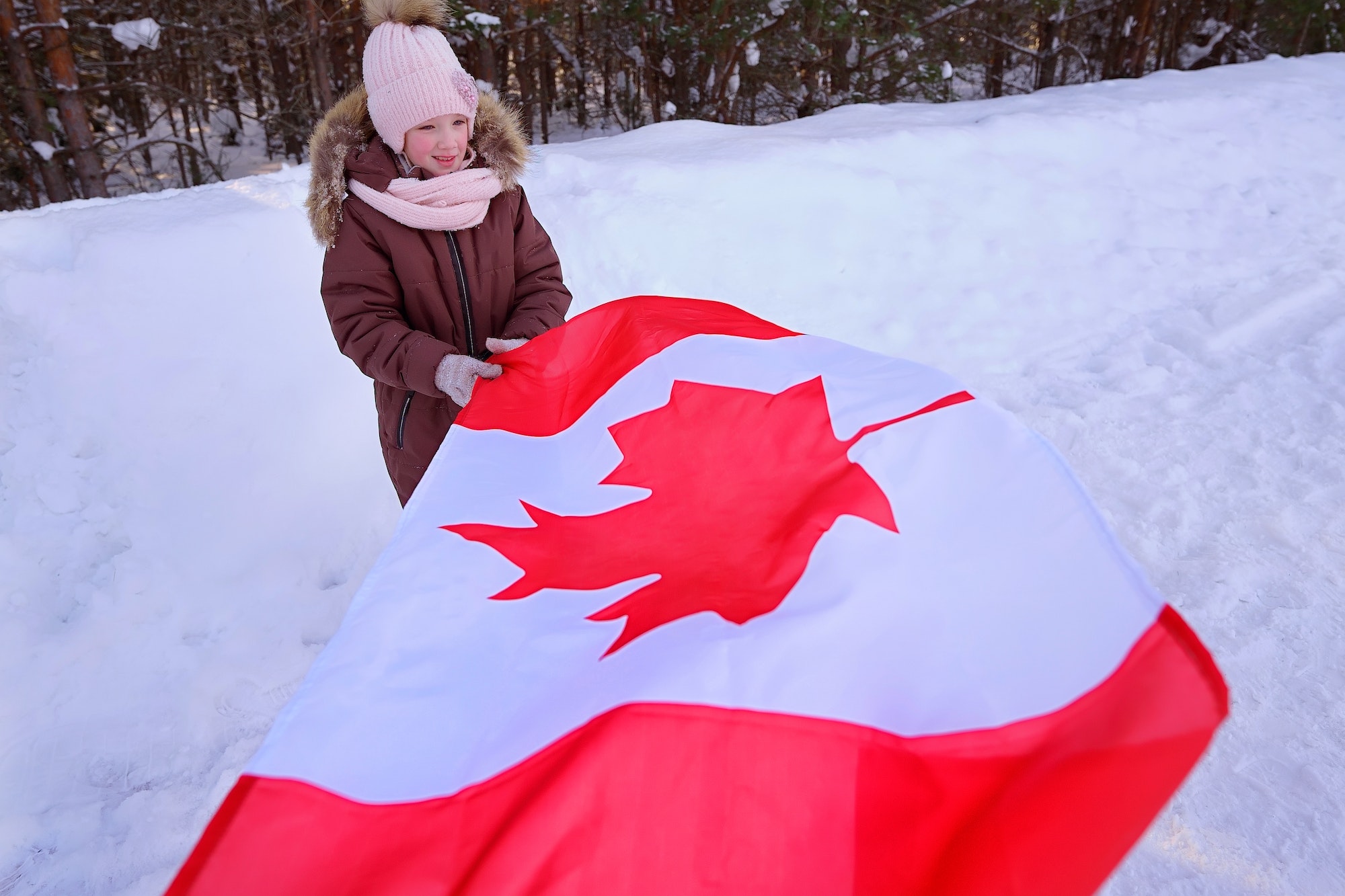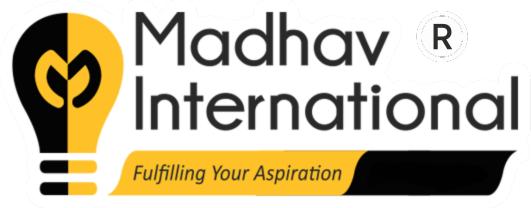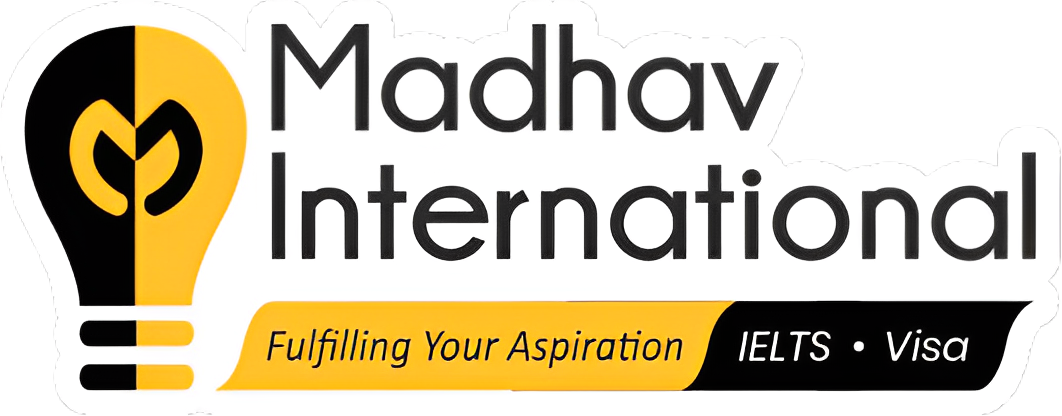Study Abroad
- Study In Canada
- Study In USA
- Study In UK
- Study In Australia
- Study In New Zealand

Any Questions? Call us
+91 97127 89001
Any Questions? Email us
info@madhavinternational.co.in

Why Canada ?
Canada, the second largest country in the world, is both a geographically vast and an ethnically diverse country to study in. Canada is a country located in the northern part of North America. Canada’s climate varies widely across its vast area, ranging from arctic weather in the north, to hot summers in the southern regions, with four distinct seasons. Canada’s natural environment offers many recreational opportunities as well as a high standard of living in cosmopolitan and multicultural cities.
There also are inhabitants of a multicultural and bilingual country which welcome students from all religions and nationalities. Thousands of students come to study in Canada every year and even more come to Canada to learn English or French. Canadian universities and education institutions offered some well-tailored programmes in a variety of fields. The courses may differ slightly from institute to institute but all in all these courses aim to provide comprehensive support and peerless teaching and training to students that enrol with them. A delightful little factoid that is really attractive to most students is that 90% of students who graduate from Canadian institutes get
Highlights of Canada
Capital: Ottawa
GDP:1500+ trillion dollars
Largest City: Toronto
Official Language(s): English & French
Per Capita Income: 41,506 CAD (Heighest in the world)
Area: 9,984,670 KM2 – 3,854,085 Mi2
An average 2.5 Lakhs people migrate to Canada each year since 1991.
Major Intake: January, May and September
Education System In Canada
The education system of Canada is divided in 3 sections – Elementary, Secondary and Post- Secondary. There is no real federal system of education in Canada. The Education in this country is under the jurisdiction of the provinces and territories. Canada’s exemplary commitment to education is showcased by the fact that public education here is free till the secondary school. Education after secondary school are either community colleges or universities. In post-secondary section education institutes are divided into the following brackets:
Certificate
These courses are about a year in length.
Diploma
These courses are two years in length.
Advanced Diploma
A 3 year programme which can also open the door to a bachelor’s degree.
Post Graduate Diplomas/Certificate
These programs usually last for 12 to 17 weeks and are a gateway to a master’s degree. They provide practical experience and theoretical study and are sometimes a prerequisite to participate in a bachelor’s program.
Bachelor’s Degree
Awarded by universities, colleges and community colleges after four years of study and are usually followed with graduate level studies.
Master’s Degree
Lorem Graduates who want to pursue learning and research in their field and increase the scope of occupation after education, usually go for a master’s degree. These degrees are usually 2 years long and are usually done after a 4 year or 3-year bachelor’s program.
Doctorate or PhD
Ranking above the master degree it generally takes about 4 to 7 years to finish. These courses in the various colleges, universities and education institutes in Canada provide students with ample opportunities to broaden their educational horizons. The degrees obtained here are considered at par with US universities and that of other Commonwealth countries.
The Madhav International will be able to guide you on the basis of your academic record, extracurricular activities, your performance in test like IELTS your financial background etc. Once you have chosen a place to study you will need to apply to that school, college or university. Once the student receives his/her letter of acceptance from the educational institution, he/she will need to apply for the student permit. The time needed to process an application to study in Canada may be different at various visa offices. One does not need a study permit if you plan to take a course or programme in Canada that lasts six months or less. You must complete the course or programme within the period authorised for your stay in Canada.
Cost of Study expenses for International Students:
- Diploma : Approx. 10000 - 20000 CAD/year
- Advanced Diploma : Approx. 15000 - 17000 CAD/year
- PG Diploma : Approx. 15000 - 18000 CAD/year
- Bachelor’s Degree : Approx. 20000 - 25000 CAD/year
- Master’s Degree : Approx. 16000 – 24000 CAD/year
Other expenses for International Students
- Average living cost: Between 10,000 to 15,000 CAD /year
- Transportation Cost- 80 to 100 CAD/month
Canada Visa Process

Job Opportunities
Earn while you learn’ might be the motto of every international student in Canada, especially those from developing countries, given the nation’s high tuition fees and substantial living costs. International student can work up to 20 hours per week during their studies and 40 hours during their vacation. Canadian high commission encourages International students to earn work experience after their completion of studies with no restrictions on the types of employment and no requirement for a job offer. The Work Permit states that International students who have studied for 2 years are eligible for 3 years extension & students who have studied for 1 year are eligible for 1 year extension.
PR Opportunities
There are many Canadian immigration options for students who are studying in a program in Canada for at least 2 years. Students with previous experience in Canada are more attractive to Canadian employers, and because of the excellent quality of Canadian schools, Canada is eager to retain foreign students that have graduated from its educational institutions. It is possible to apply for both temporary (work and study) and permanent residence in Canada – this is called dual intent. Dual intent allows students to apply for permanent residence, while at the same time securing their temporary study permit. For students, this makes Canada an even more attractive place to study.
FAQs about Canada
Universities work independently formulating their own curricula, teaching methods and strategies.Besides they can set all the policies, and do academic planning.Colleges on the other hand are permitted to provide degrees only after a quality assessment process by the government.
The Immigration Consultants of Canada Regulatory Council (ICCRC) is a non-profit organisation that is put in place by the Canadian government to regulate the immigration consulting profession. Rao Consultants are proud, longstanding members of the ICCRC. The Council safeguards the interests of the consumers by regulating and keeping tabs on the immigration consultants that provide immigration consultation to interested individuals. It should be noted, however, that it is not mandatory for students to apply via an ICCRC member.
When you complete a BA degree from a Canadian institute you are eligible to do postgraduate studies in Canada with support of Canadian authorities.
In most of the cases, Master degree takes a whole academic year including an internship. Master degree can also last for two academic years. So it depends on the curricula and the program.
You are, under certain circumstances, allowed to work while studying in Canada. When you are applying for your student visa, however, you are required to prove to your visa officer that you have enough finances to support yourself for the duration of your study program. International students are allowed to work on the campus or off-campus, although off-campus is authorized only 6 months into the course. Full time students can work in their institutions without any employment authorization.
International students are allowed to work up to 20 hours every week when their course is on and 40 hours per week during their vacations. They can expect to earn around 7 to 10 Canadian dollars per hour. During co-op terms students can earn up to 10 to 15 Canadian dollars an hour. This can amount to about 400 to 1000 Canadian dollars every month.
Yes. Canada offers a huge array of career-oriented programs. These range from advanced diplomas to certificate courses. These courses are specifically designed so as to give students the opportunity to learn and develop skills that are marketable in the modern workplace. These courses highlight the technical aspects and focus on providing hands-on experience about the fundamental nitty-gritties of the programme. Diplomas and certificate courses offer students the practical background they need to become more hireable by employers in the country. It is very much a possibility that students that do vocational programmes get better salaries than those that have done a university programme.
In most of the cases, Master degree takes a whole academic year including an internship. Master degree can also last for two academic years. So it depends on the curricula and the program.
Health insurance is mandatory for studying in Canada. You will need to procure health insurance before you reach Canada. Medical coverage changes from province to province and often from university to university. Most universities have health insurance coverage as a part of their fees.
Hostels can be a great low-budget temporary accommodation in a big city.
A valid study permit holder who is doing a full-time course at a post-secondary institution is eligible for an open work permit. The open work permit for a spouse or a common law partner may be valid for the same period of time as the study permit, or as long as the study permit remains valid. The applicant needs to indicate in their applications if their spouse or partner will be accompanying them to Canada. If the spouse or partner decides, at a later stage, to study in Canada they need to submit a separate application.
Yes. If you have studied for a one year degree you get a one year work permit, if your course is of two years you can get a work permit for two to three years, depending upon your course and duration of the same.
Yes you can, although you will need to contact your nearest Canadian Immigration Centre at least two months before your study permit authorization expires.
Usually international students go for part time opportunities in service industry, and do such jobs as cleaning, washing, servicing in restaurants/cafes as waiters, etc.
An individual who is already in Canada on a study or work permit will not need to get a separate study permit for his or her minor child. The study permit the individual has applied for should have already indicated that their minor child would be accompanying them. The age of majority differs slightly in different provinces, although it is usually around 18 or 19.
As Canada is divided into individually governed provinces the tuition fees for an academic year of tertiary education vary. or the French ones.
Education in Canada is often considered as a safe route to getting permanent residency of Canada. There are a number of federal and provincial programmes that offer international students a means to settle in Canada. This is possible even without a job offer. Canadian education and job experience usually gains you additional points on the Comprehensive Ranking System (CRS) used for Express Entry.
IELTS exam scores are the most common language requirement for Canadian universities. But most universities will accept either TOEFL or IELTS.
Usually institutions require an essay and a personal statement (which talks about you and why you are suitable candidate for the chosen program) along with documents stating your working experience. If a student has additional documents such as reference letters or some activity diplomas/certificates, he/she surely should show it.
Generally Applicants require:
- Proof of acceptance and enrolment to an accredited academic institution in Canada
- A valid passport/travel document and proof of financial support
Proof of no criminal history or endangering medical conditions
If you speak English there will not be any issues residing and working in either the English provinces or the French ones.

































